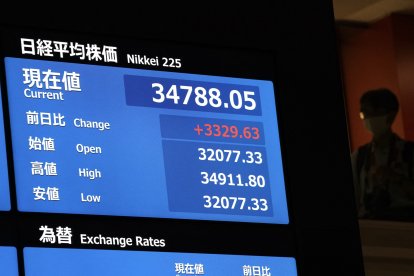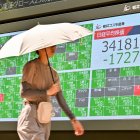The Tokyo Stock Exchange rebounds more than 10% after Monday's record fall
The benchmark index, the Nikkei 225, was experiencing a 10.33% rise to 34,707.78 points.

A quote board shows the share price on the Tokyo Stock Exchange on Aug. 6, 2024
The time has come to hunt for bargains. At Tuesday's opening, the Tokyo Stock Exchange was up more than 10 percent after a "black Monday" with a record drop triggered by US jobs data, fears of a US recession and yen appreciation.
Japan's benchmark stock market index, the Nikkei 225, experienced a 10.33% rise to 34,707.78 points, a number that represents an all-time intraday record high in points. Meanwhile, the Topix rallied 10.26% to 2,455.64 units.
The rebound comes after the Nikkei closed Monday with a thunderous loss of 12.40%, dropping more than 4,451.28 points, a figure that represented the second-largest point drop in the history of that index.

Economy
Concerns about the US economy plunge the markets: Nikkei and cryptocurrencies plummet
Juan Carlos Téllez
The fall of the Tokyo Stock Exchange had a global impact. In general, the major Western stock exchanges closed Monday with losses, although they were not as pronounced: 2.60% on Wall Street, 1.42% in Paris, 2.04% in London, 1.82% in Frankfurt and 2.34% in Madrid.
However, despite Tuesday's rebound, experts warn that the rise may be delicately volatile.
"The market is starting strongly higher given that it should experience a natural recovery after yesterday's plunge," said brokerage Monex.
Meanwhile, according to AFP, Japanese bank Nomura also warned of market volatility this week.
"Today's gains can be explained in one phrase: technical rally," the entity announced.
According to an AFP tally, some of the firms benefiting from the stock market recovery were Honda (+14.90%), Toyota (+10.51%), Sony (+7.44%) and Nintendo (+9.87%).
The Wall Street Journal detailed that technology stocks, which took a heavy hit on Monday, also began to recover. For example, semiconductor maker Tokyo Electron rose 17 percent.
Likewise, Japanese 10-year government bond yields also saw an improvement, recovering to 0.87% from 0.75% Monday afternoon. The WSJ details that this represents less concern about a recession.
According to Forbes, the rebound in the Japanese stock market is largely explained by investors opting to bargain hunt after the slump.
In addition, the media outlet detailed that Japanese investors "also reacted this way to the slight depreciation of the yen against the euro and the dollar, a trend that benefits large Japanese exporters by repatriating their profits abroad."












